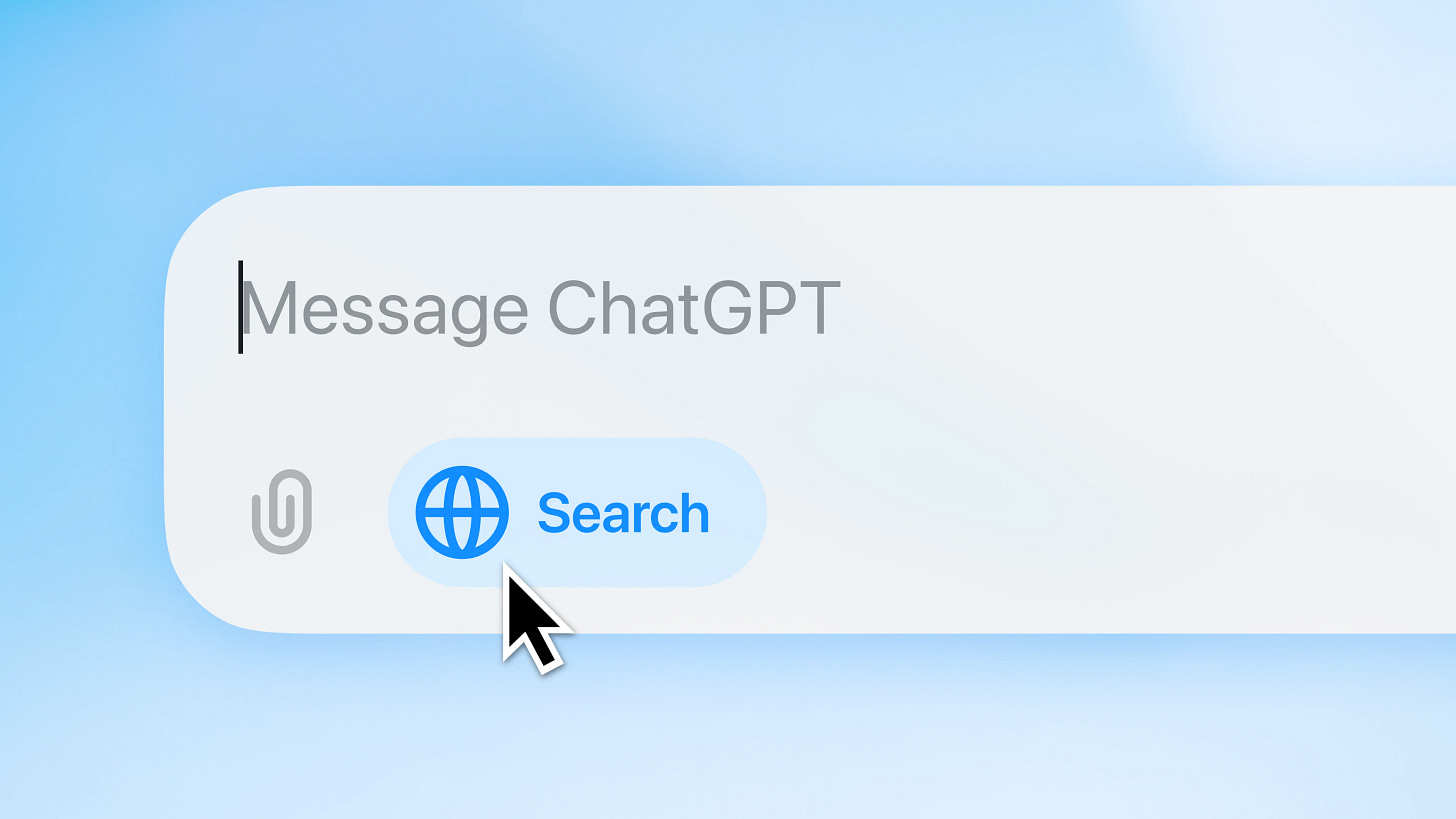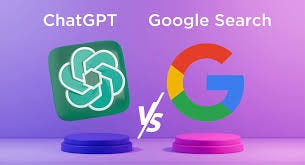The Search Evolution: Balancing Inquiry and Generation in AI
The Search Evolution: Balancing Inquiry and Generation in AI
Exciting news! My new e-book (co-authored with ) just launched on Amazon (October 29, 2024). We'd love to hear your thoughts after you've had a chance to read it. Please drop us a review on Amazon in you have a chance. You can find the book here!!!
Over the past few weeks, several free subscribers have decided to become paid subscribers. I just want to send out a heart felt:
These conversions bring a big smile to my face as I feel that they really affirm all the hard work I put into this Substack week-in and week-out.
As an educator who has spent the past two years implementing AI in secondary education, I've watched the evolution of AI search capabilities with both excitement and concern. Yesterday's simultaneous announcements from major AI players about their search capabilities marks a pivotal moment in how we access and process information. The convergence of these announcements - OpenAI's ChatGPT Search, Google's Gemini API grounding, and rumors of Meta's entry into the space - presents an opportunity to examine how these tools might reshape our relationship with information discovery and knowledge creation.
Before we get deeper into the analysis, I like to offer my readers a bit of a user guide.
Using ChatGPT Search: A Quick Guide
Credit: Based on Sabrina Ramonov's technical overview (check her prompt library out!!!)
Two Ways to Search
Automatic: ChatGPT searches when it needs current info
Manual: Click "Search the web" icon to force a search
Verifying Sources
Look for "Sources" button at bottom of responses
Click through to original sources
Multiple sources indicate comprehensive search
Best For:
Current events and news
Weather and sports updates
Local information (restaurants, services)
Fact-checking and verification
Pro Tips:
Refine through conversation: Start broad, then narrow down
Check sources: Always verify important information
Chrome extension: Type "!g" before query to use Google instead
Current Access:
Available: ChatGPT Plus, Team users
Coming soon: Enterprise/Edu users
Rolling out: Free users over coming months
Note: Features and availability as reported by OpenAI, November 2024
The New Search Landscape
, writing about SearchGPT in August, identified the fundamental tension we're now seeing play out:"Traditional search engines and LLM assistants have fundamentally different UX patterns. Google was designed to send users elsewhere as fast as possible; ChatGPT is designed to generate responses as helpfully as possible. This shift in user interaction could significantly impact how we consume information, potentially leading to longer, more in-depth engagements with AI assistants rather than quick jumps between websites."
This observation perfectly captures what I've come to think of as the distinction between inquisitive AI (which promotes active inquiry) and generative AI (which creates content). The difference is crucial for understanding how these tools might affect learning processes.
The latest developments show how each major player is approaching this tension differently. OpenAI's Adam Fry, demonstrating their new search capabilities, showed how ChatGPT can now handle complex, multi-step queries:
"In a pre-launch demo, OpenAI's ChatGPT search lead, Adam Fry, showcased the feature by searching for Apple's stock and any relevant news. In return, it displayed an interactive stock graph, upcoming earnings information, and news articles with clickable citations linking to original sources."
This interactive, multi-modal approach represents a significant evolution from traditional search, but it also raises questions about how users engage with information. Are they truly exploring and learning, or simply consuming pre-digested knowledge?
The Technical Architecture
Google's approach with their Gemini API reveals a different philosophy. As reported by TechCrunch, they're offering granular control over how grounding works:
"Turning on grounding is as easy as toggling on a switch and deciding on how often the API should use grounding by making changes to the 'dynamic retrieval' setting. That could be as straightforward as opting to turn it on for every prompt or going with a more nuanced setting that then uses a smaller model to evaluate the prompt and decide whether it would benefit from being augmented with data from Google Search."
This technical detail matters because it shows how the architecture of these systems can influence the balance between inquisitive and generative modes of interaction.
The Publisher Ecosystem
The relationship between AI search and content creators presents another crucial dimension. Charlie Guo highlights the emerging business model challenges:
"That's why Perplexity is figuring out a new business model, in the form of a Publishers Program. Advertisers can pay to have 'related follow-up questions' (i.e. ads) show up after a user completes a query. At the same time, 'partners' (i.e., media outlets) are paid whenever their content appears alongside a sponsored follow-up."
OpenAI's approach to this challenge, as reported by The Verge, involves direct partnerships:
"OpenAI has secured a litany of media partnerships in the last year, including big names like Hearst, Condé Nast, Axel Springer, and News Corp. While Fry says those partners will get more 'control' over how their content surfaces in ChatGPT, they won't be automatically given higher priority in queries."
These different approaches to content sourcing and attribution directly affect how students might interact with and verify information, compounding issues related to digital access and equity.
The Hallucination Challenge
A critical concern for educational applications is the accuracy of AI-generated responses. OpenAI's Fry addresses this directly:
"Some amount of hallucinations come from just really not having access to the latest information. And so now that it has access to the latest information, it actually helps it make better decisions around what is the true, factual answer."
However, as The Verge notes, there's still room for concern:
"As for hallucinations — like when Google's AI Overviews infamously told users to put glue on their pizza — Fry believes that ChatGPT search is going to 'increase factual accuracy overall.'" When pressed about the fact that edge cases exist and mistakes are inevitable, he said "we'll try to be transparent" if it does trip up."
The AI Use Spectrum in Education
This brings us to the heart of the matter for educators. I propose viewing AI use in education along a spectrum:
Google's Shrestha Basu Mallick inadvertently highlights why this distinction matters:
"When I get an LLM answer, I often go to Google Search and check that answer. We're providing a way for them to do this easily, so this is much valued by users."
This instinct to verify and explore beyond the initial AI response is exactly what we should be cultivating in students.
The Path Forward
Charlie Guo poses the essential question:
"Are we losing something important and immeasurable by running all our consumption through an AI? Do we run the risk of 'dumbing ourselves down' as we increasingly rely on automated summarization?"
As educators, our response should be to develop frameworks that:
Balance Efficiency and Engagement:
Use AI search as a starting point for inquiry, not an endpoint
Teach students to trace AI-provided information back to primary sources
Encourage critical engagement with both AI summaries and underlying sources
Develop AI Literacy:
Help students understand when to use inquisitive vs. generative AI modalities
Teach verification strategies for AI-provided information
Foster awareness of AI's limitations and potential biases
Maintain Academic Rigor:
Set clear guidelines for appropriate AI use in different contexts
Develop assignments that leverage AI's strengths while promoting critical thinking
Create assessment methods that account for AI's capabilities
Moving Forward
As these new search capabilities roll out, we have an opportunity to shape their educational use. The key isn't to avoid generative AI features entirely - they can be valuable tools for learning and creation. Rather, we need to be intentional about when and how we use different AI modalities, particularly in research and inquiry-based learning.
The goal is to harness these tools in ways that enhance rather than replace critical thinking and active learning. By understanding when to leverage inquisitive vs. generative AI features, we can better guide students toward meaningful engagement with these powerful new tools while maintaining the essential skills of academic inquiry.
Nick Potkalitsky, Ph.D.
Introducing Two AI Literacy Courses for Educators
Pragmatic AI for Educators (Pilot Program)
Basic AI classroom tools
Cost: $20
Pragmatic AI Prompting for Advanced Differentiation
Advanced AI skills for tailored instruction
Cost: $200
Free 1-hour AI Literacy Workshop for Schools that Sign-Up 10 or More Faculty or Staff!!!
Free Offer:
30-minute strategy sessions
Tailored course implementation for departments, schools, or districts
Practical steps for AI integration
Interested in enhancing AI literacy in your educational community? Contact nicolas@pragmaticaisolutions.net to schedule a session or learn more.
Check out some of my favorite Substacks:
Mike Kentz’s AI EduPathways: Insights from one of our most insightful, creative, and eloquent AI educators in the business!!!
Terry Underwood’s Learning to Read, Reading to Learn: The most penetrating investigation of the intersections between compositional theory, literacy studies, and AI on the internet!!!
Suzi’s When Life Gives You AI: An cutting-edge exploration of the intersection among computer science, neuroscience, and philosophy
Alejandro Piad Morffis’s Mostly Harmless Ideas: Unmatched investigations into coding, machine learning, computational theory, and practical AI applications
Amrita Roy’s The Pragmatic Optimist: My favorite Substack that focuses on economics and market trends.
Michael Woudenberg’s Polymathic Being: Polymathic wisdom brought to you every Sunday morning with your first cup of coffee
Rob Nelson’s AI Log: Incredibly deep and insightful essay about AI’s impact on higher ed, society, and culture.
Michael Spencer’s AI Supremacy: The most comprehensive and current analysis of AI news and trends, featuring numerous intriguing guest posts
Daniel Bashir’s The Gradient Podcast: The top interviews with leading AI experts, researchers, developers, and linguists.
Daniel Nest’s Why Try AI?: The most amazing updates on AI tools and techniques
Riccardo Vocca’s The Intelligent Friend: An intriguing examination of the diverse ways AI is transforming our lives and the world around us.
Jason Gulya’s The AI Edventure: An important exploration of cutting edge innovations in AI-responsive curriculum and pedagogy.










Nick, love the distinction between Inquisitive and Generative, really helpful.
This is top of mind for me these days as I make the rounds trying to explain to educators why searchGPT is a big deal and what it entails, as data seems to suggest students are preferring AI search to Google w/o verifying.
Another flag is that the partnership with German partners is problematic as Axel Springer owns “unserious” or boulevard media like Bild. Some have tried to block their content when querying.
Generally, it’s amusing to me that all this means MORE work to verify things. It means more information literacy is required. 🙂